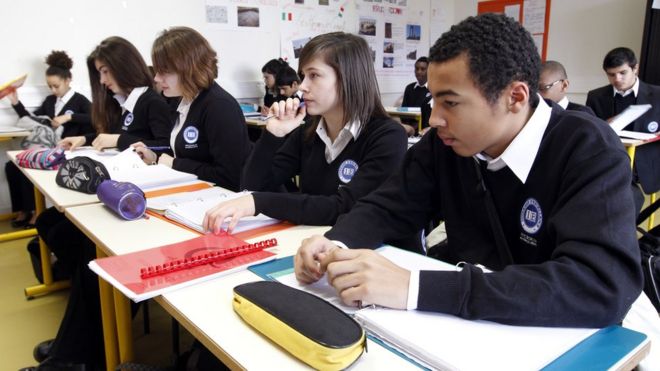French town near Paris votes to have school uniforms

Parents in a town near Paris have voted in favour of school uniforms for their pre-teen children - a rare development in French state education.
Six primary schools in Provins, teaching children from age six to 11, will adopt the dress code in November.
On Sunday the education minister, Jean-Michel Blanquer, said schools must be free to introduce school uniforms, but the government would not rule on it.
Most children in the EU, apart from the UK, do not wear school uniforms.
French news website LCI says the Provins children - 759 in total - will be encouraged, but not forced, to wear a standard blue polo shirt bearing the French republican motto: "Liberty, Equality, Fraternity". The 10-piece uniform, including the shirt, will cost €145 (£127; $170).
If a family has more than one child in that age group the uniform will be €72.50.
According to a September 2016 survey in France, 65% of respondents were in favour of introducing school uniforms. French news magazine L'Express reports that the percentage in favour has grown year-on-year; in 2011 it was 50%.
Mr Blanquer said he favoured uniforms because they could "encourage pride in the school" and "it's a question of equality between children".
"Clothes brands count for too much these days. The uniform can be an answer to that."
 President Emmanuel Macron's election manifesto did not spell out any policy on school uniforms, but it did promise to ban mobile phones from classrooms.
President Emmanuel Macron's election manifesto did not spell out any policy on school uniforms, but it did promise to ban mobile phones from classrooms.
The Muslim headscarf and other overt religious symbols are banned from French schools - and the Macron manifesto said it would "enforce secularism strictly". But the headscarf ban would not be extended to universities, it said.
Provins is in Seine-et-Marne district, where the Sourdun School of Excellence, catering mainly for children from disadvantaged backgrounds, already has a compulsory uniform.
No ink pens, no smocks
A minority of other French schools - some private, some in the state sector - also have uniforms. Among them are schools linked to the military, such as the Légion d'honneur academies.
Until the 1960s most French children wore standard smocks at school, to protect their clothes from ink stains. Once ballpoint pens were introduced the smocks were phased out.
Uniforms are, however, standard in schools in the French Caribbean: the territories of Martinique, Guadeloupe and French Guiana.
Catherine Nave-Bekhti of the French teachers' union Sgen-CFDT said "no scientific study has ever shown that wearing a uniform makes an education system more efficient".
Quoted by French new site BFMTV, she also rejected the argument that a uniform could help make children more equal, saying "inequalities exist outside school".
For more than 400 years, most schools in the UK have required children to wear uniforms, a few of them little-changed for centuries, including the school coat of arms.
Before World War Two many German schools also had uniforms, but they were generally scrapped after the war, partly to erase any reminders of the Hitler Youth.
Uniforms are generally worn in schools in Russia and Japan, but unlike in the UK, they do not usually have an individual school's branding.
My Response:
Audience:
I think that the audience of this article is targeted at European families with children in school.
Bias:
I think that there is some bias against the school and parents who decided to have the uniforms enforced. Because the majority of Europe doesn't use uniforms, having more schools decide to have school uniforms could make pressures that could lead to more schools having uniforms.
My Opinion:
I do not think that this school should enforce uniforms, or even suggest to have them, especially if the decision is made from a parents' vote. Of course parents will want the best for their children, and if they are told that uniforms are that, then they will be in favor of them. However, many parents are not informed on some of the facts that are stated in this article that are against uniforms. I think that experts should make the decisions on whether a school should have uniforms or not. I also want to bring to attention the line in the article where it says, "The Muslim headscarf and other overt religious symbols are banned from French schools - and the Macron manifesto said it would "enforce secularism strictly". But the headscarf ban would not be extended to universities, it said." I definitely do not agree with this. I believe that people should have the right to their own religions, and this would violate a religion's laws. This would be an extremely hard thing for Muslim families to face, and shouldn't have to be something that they face.
Comments
Post a Comment